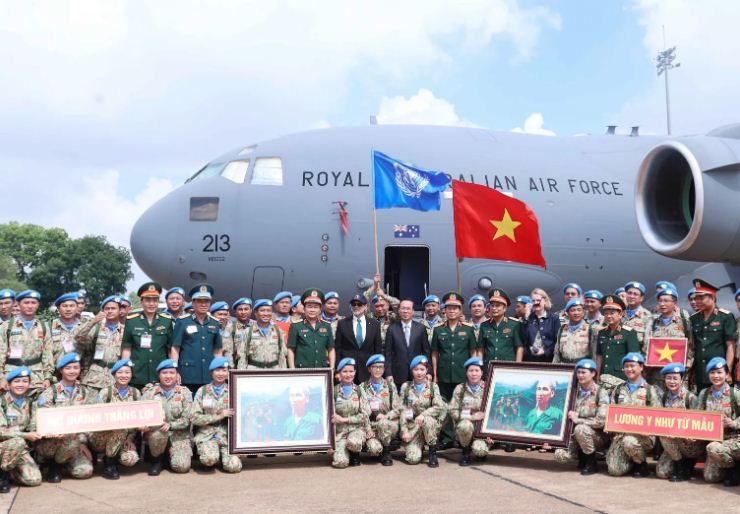Defence diplomacy contributes to safeguarding Fatherland early, from afar

Hanoi, December 22 (VNA) - Applying the strategy of defending the country into the future during the revolutionary struggle, the Communist Party of Vietnam (CPV) has always paid attention to expanding solidarity and international cooperation to maintain the nation's independence and unification.
During the doi moi (renewal) process, the Party led the country to extensively enhance international integration, focusing on defence cooperation, clearly stating that the mission of defence diplomacy is to promote bilateral cooperation, actively join multilateral cooperation mechanisms, strengthen strategic trust, and improve the position and prestige of the country and the army.
Vietnam steadfastly follows its defence policy of peace and self-defence. It resolutely and persistently fights to resolve all disputes and differences by peaceful means based on international law, proactively prevents and repels the risk of war under the motto of safeguarding the Fatherland early and from afar through peaceful measures, and is ready to fight against aggression wars.
Vietnam steadfastly follows its defence policy of peace and self-defence, not participating in military alliances or partnering with one country against another, not allowing foreign countries to set up military bases in Vietnam or use its territory against other countries, and not using force or threatening to use force in international relations.
International integration, defence diplomacy contribute to safeguarding Fatherland early, from afar
Safeguarding the Fatherland early and from afar has been considered as one of the defence and security tasks to successfully implement the cause of national defence and construction. Under the leadership of the CPV, with the direct leadership of the Central Military Commission, the Ministry of Defence has recorded many achievements in international integration and diplomacy.
The international integration and defence diplomacy policies are implemented proactively, concentrating on expanding cooperation with countries worldwide, particularly neighbouring nations whose borders are adjacent to Vietnam’s and major countries; ensuring balance in relationships on the principles of equality, respect, mutual benefit and adherence to international law; and preserving a peaceful environment for the country's development.
Vietnam has established defence ties with over 100 countries, opened 33 military attachés offices in foreign countries and the United Nations (UN), and allowed 52 countries to have military attaché offices in Vietnam.
Promoting cooperation with countries across the globe contributes to strengthening strategic trust between Vietnam and other countries, improving the position and prestige of the country and its army in the international arena, thus making an important contribution to defending the Fatherland early and from afar.
Vietnam has improved foreign relations with neighbouring countries sharing borderlines such as China, Laos, and Cambodia through signing and implementing cooperation agreements with their border protection forces. Coordinating with them is important in the fight against cross-border crimes and illegal migration and increasing joint border patrol activities on land. Organising border friendship exchanges with neighbouring countries is as important as sharing experiences and expanding cooperation in training, and military technology science.
The navy, coast guard, and forces operating at sea have intensified exchanges and cooperation with partners of countries whose sea areas are adjacent to Vietnam’s, to promote mutual understanding and trust, jointly resolve maritime security-related issues and control problems arising at sea to prevent conflicts; well maintained security and law enforcement at sea through bilateral consultation mechanisms and signing cooperation documents; and organised joint patrols with navies and maritime law enforcement forces of other countries.
The Ministry of Defence has actively engaged in most international and regional mechanisms and forums, including military cooperation within the framework of ASEAN and between the bloc and its partners, dialogues as well as international multilateral mechanisms and organisations. In particular, the ministry successfully hosted numerous significant activities, earning high praises from the Party, the State, the people, and international friends.
In addition, the active participation and speeches presented by leaders of the Ministry of Defence at international security forums, especially the Shangri-La Dialogue, the Beijing Xiangshan Forum, and the Moscow Conference on International Security, helped international community clearly understand Vietnam’s policy of peace and self-defence.
At these forums, representatives of the Ministry of Defence affirmed that Vietnam's policy of strengthening defence capabilities is solely aimed at protecting sovereignty, territory, and the Fatherland. Vietnam is consistently deploying a “four no's” defence policy: not joining military alliances, not associating with one country against another, not allowing foreign countries to set up military bases or use Vietnamese territory to oppose other countries, and not using force or threatening to use force in international relations. This importantly contributes to transparency in policy and strengthens strategic trust.
Vietnam joins UN peacekeeping forces
Joining UN peacekeeping forces has helped Vietnam assert its position, credibility, and image as a friendly nation that advocates peace and has a high sense of responsibility toward the international community.
In addition, joining UN peacekeeping forces has helped Vietnam assert its position, credibility, and image as a friendly nation that advocates peace and has a high sense of responsibility toward the international community.
Apart from sending military officers for duties at UN peacekeeping missions, Vietnam has dispatched five field hospitals to South Sudan, and deployed military engineering units to the UN peacekeeping mission in the UN Interim Security Force for Abyei (UNISFA).
Vietnamese “blue-berets” soldiers have earned appreciation from UN peacekeeping missions and agencies for their professionalism, high standards of discipline, and creativity; and garnered support not only from the leadership of UN peacekeeping missions, heads of international military forces, and local communities in the host country. These have contributed to affirming the international integration effort of the Vietnam People's Army (VPA) and its ability to work in a multilateral environment.
Implementing the foreign policy of the Party and thoroughly following the mindset and theory of protecting the Fatherland early and from afar, international integration activities and defence diplomacy have extensively expanded in both bilateral and multilateral aspects, therefore contributing to consolidating and improving the position of the country and the VPA on the international stage./.





